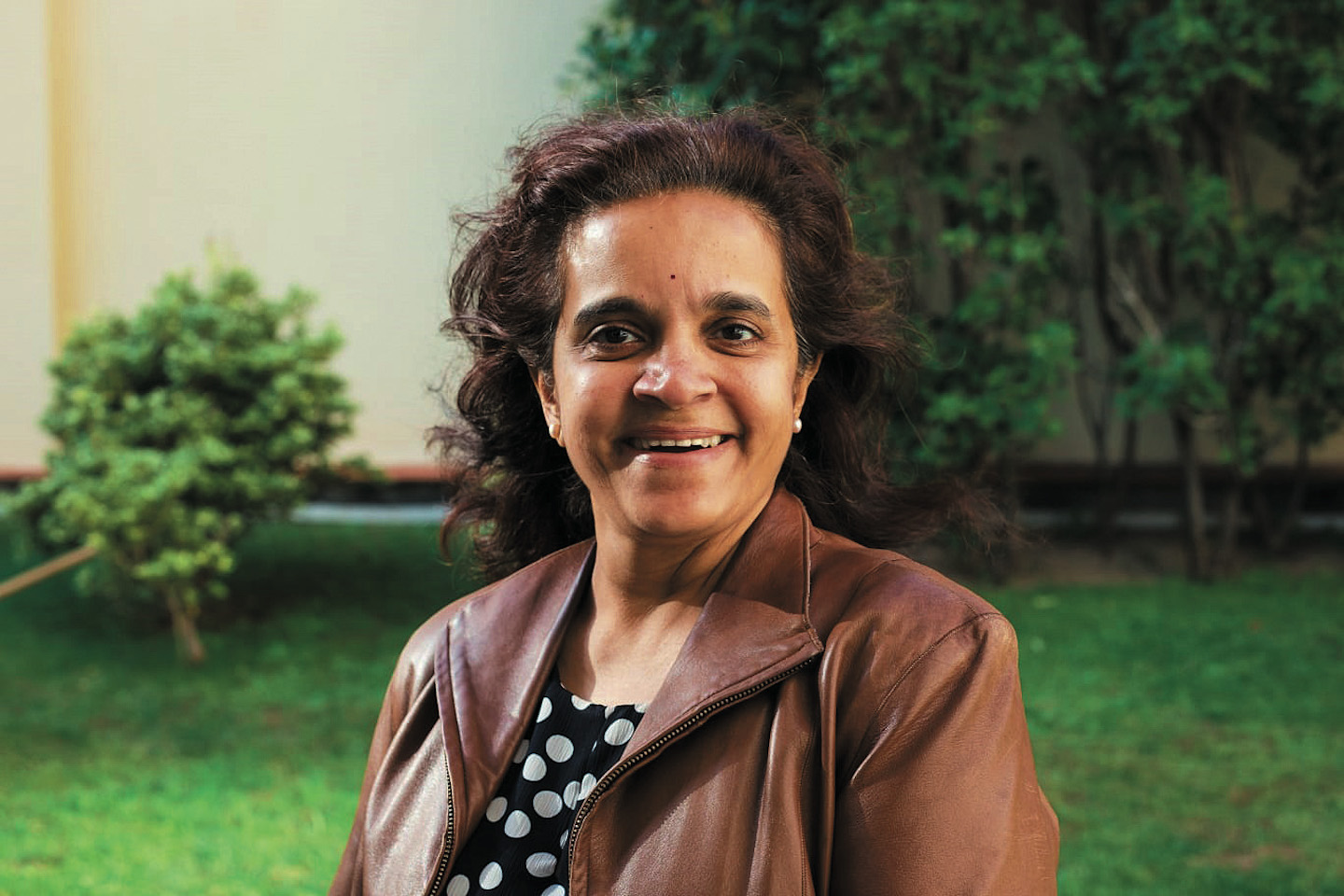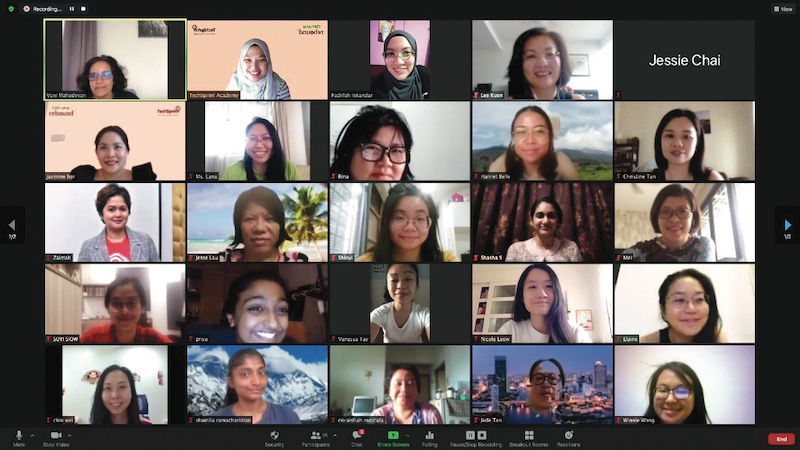
Vani is also the founder of Malaysia’s first women-only coding school, TechSprint (All photos: Rebound)
Vani Mahadevan was out on her morning walk, listening to a podcast from The Guardian, when she first heard the term “pink recession”. Also known as pink collar recession, it refers to the phenomenon where more and more women and working mothers are sacrificing their careers by cutting back hours or leaving the workforce altogether. In fact, the massive and disproportionately negative impact of the Covid-19 pandemic on women has the potential to dial back decades of progress made towards achieving greater gender equity in the workplace and disrupt myriad individual career trajectories.
This has been increasingly evident in industries that already do not see a lot of female participation — this runs the gamut from oil and gas to aeronautics and aerospace engineering, and the software and tech industry. A trained accountant, seasoned entrepreneur and director of StartupMalaysia, Vani is also the founder of Malaysia’s first women-only coding school, TechSprint, which provides a safe space to learn tech-related skills and connect with other women in the tech industry. The syllabus is courtesy of CodeOp, an international coding school for women based in Barcelona, Spain, that was established by Silicon Valley entrepreneur Katrina Walker.
Based on what she was already doing with TechSprint, she saw a way to bridge the gap and help women whose livelihoods were affected by the pandemic to get back into the game again. “Beyond the opportunities that TechSprint was already offering women, I felt that there was a bigger role to play here. Not all women want to become a software developer or a hardcore coder — women also need tech skills beyond what you can find online but in the similarly safe space that TechSprint provides. To me, TechSprint was always going to have two parts — the first is the commercial part and, second, a not-for-profit part that would upscale and uplift women.”
Vani had the idea for Rebound at the back of her mind, and as she ran TechSprint, was on the constant lookout for ideas and opportunities that would bring it to life. The universe heard her, she quips, as The Asia Foundation announced a series of grants focused on women and technology. She submitted her plan for Rebound, and it was approved for a pilot programme in 2020. The timing was also impeccable — the pandemic had just hit and many people were losing their jobs, making Rebound’s career comeback programme exactly what many women needed. “All the puzzle pieces fell into place — pink recession, TechSprint, my plans for a not-for-profit initiative,” Vani says proudly.
rebound.jpeg

Rebound, which kicked off last October, is designed to equip women with the relevant tools to help them transition into new careers in the tech industry or start a new venture that is more digitally enabled. Whichever the pathway that is chosen, the aim is to help put women on the path to greater industry relevance and financial independence. The programmes, which are spread out over three levels, are delivered by industry practitioners and participants will be supported by mentors as they transition from knowledge to action. All programmes are free or subsidised and are 100% online, making them ideal for women from all over the country to participate as they juggle family and other commitments.
“To me, Rebound is unique because it’s one of the few programmes that offer women structured support on different levels, as well as a community of mentors too,” she points out. “It’s a very comprehensive ecosystem in that regard. And what we also found is that taking people step by step helps with changing mindsets and reducing the intimidation some women face in taking on a tech-related challenge.”
Rebound is open to women across Malaysia, who are aged between 21 and 50, and have taken a career break, been retrenched or not found any employment to date. Priority will be given to those from marginalised communities, single mothers from low-income socio-economic backgrounds as well as non-professionals.
The three levels are divided based on what women want. Reboot is the baseline programme that helps women plan out their personal path to a successful professional comeback. It comprises modules that enable women to understand their own strengths and keep up to date with current best practices in the professional world. Step-Up is for women to deepen their knowledge in specific technical skill sets, and is ideal for those wanting to upskill, as well as Reboot graduates.
Finally, Breakthrough is a four-month development boot camp, delivered in collaboration with CodeOp, to prepare participants to become a junior developer. The most intense of the three levels, Breakthrough, requires a 15-week commitment, 9am to 6pm, five days a week.
“The six women in the Breakthrough programme are from all over the country, which could only happen because it was delivered online. Getting into this particular one is tough — they need to pass a technical challenge that tests logical thinking and problem-solving skills, as well as an interview with the instructor. The time that they commit to this is also important — this is equivalent to a full year or semester at university! The first six women in Breakthrough did so very well, and the CodeOp team in Spain has indicated that their work is some of the best they have ever seen.”
bdw_closing_2.jpg

Rebound’s sessions are as intense as they are family-friendly, so mothers are able to handle their children in between sessions or, if necessary, have them join in and learn from them too. Vani recalls many women taking full advantage of this notable benefit, with many kids napping on their mothers’ shoulders as sessions progressed, as well as older children also picking up some skills.
The funds from The Asia Foundation are used to pay the instructors, who are industry experts and practitioners from around the region rather than pure academicians, so the education is delivered from a real-world perspective. The participants are not charged anything, but the six Breakthrough candidates are invited to make a contribution that they can afford, no questions asked. “Two reasons I did this — one was to stretch the funds, and the second was because I wanted them to have some skin in the game.”
Ever since the pandemic hit, Vani’s focus has been on Rebound’s free initiatives rather than TechSprint’s chargeable programmes. “The commercial part still runs in the background as women do want to upscale themselves but many cannot afford to do so given the current situation. That is why Rebound will continue to operate, and we are always trying to see how the programme can grow.”
It certainly has the potential to do so. Although Rebound’s target was to help slightly more than 200 unemployed and underemployed Malaysian women discover new career and economic opportunities, Vani says they nearly doubled it with 445 participants attending all of Rebound’s different programmes between last October and this February. Additionally, more than half of the participants are repeat “scholars”, choosing to attend more than one Rebound programme.
An entrepreneur like Vani would usually have a five-year plan in place for a project like Rebound, but in these extraordinary times, future-proofing too far ahead is difficult. “I think even planning three years ahead would be a big deal in the world we live in,” she laughs. “Rebound’s first round ran from last October to this month, so we would like to run a second round. We see a need for this, as so many women have indicated to us. So yes … more Rebound cohorts, but we need sponsors or funders for this to happen, either on a modular basis or for specific levels. I’d also like to see Rebound grow across the region, as the need for it exists outside of Malaysia.”
Vani also hopes to find work placements for Rebound’s graduates, particularly from the Breakthrough cohort, perhaps through corporate partnerships.
With the recent launch of the Digital Blueprint and the continued economic fallout from the pandemic, Rebound’s work is especially crucial to stem the rising impact of the pink recession. The tech industry offers many advantages — besides its low entry barrier, it forms a huge part of the growing gig economy; and with more companies going digital, the opportunities are boundless.
Women hold up half the sky so, as a society, it is important that they get the support to do what they need to do unfailingly for themselves, their families and their society every day.
This article first appeared on Mar 8, 2021 in The Edge Malaysia.


